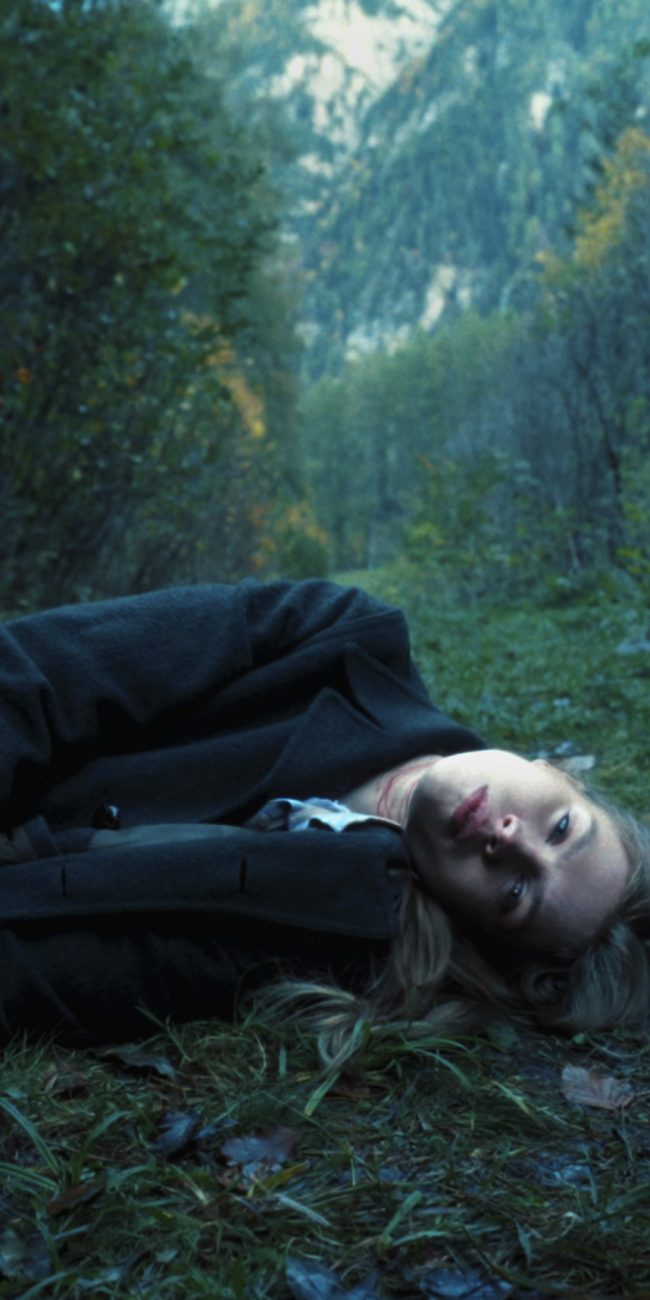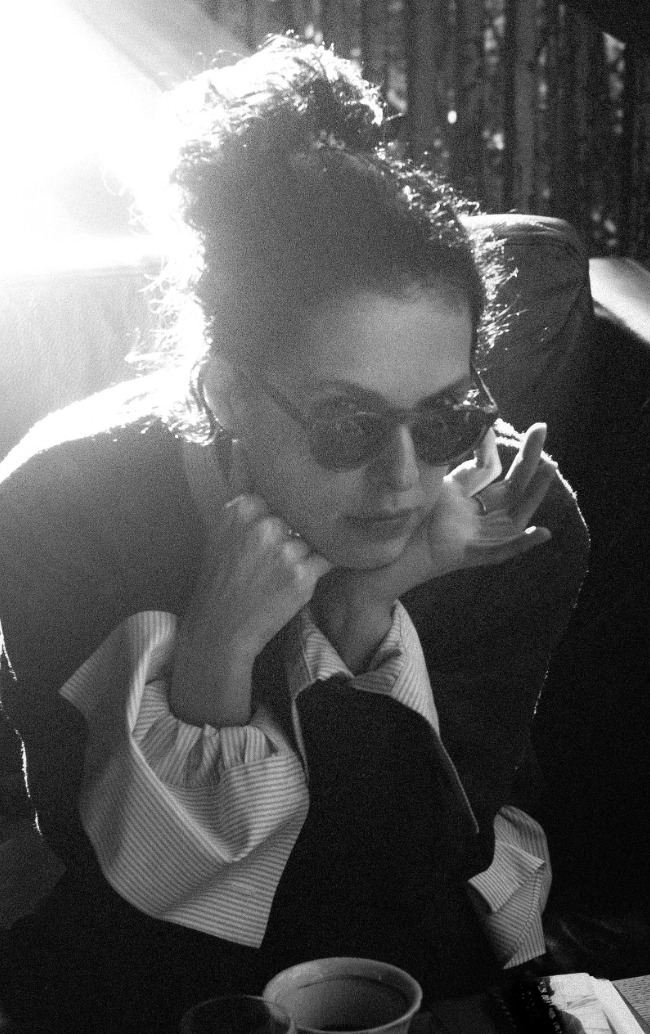A Conversation with Richard Green (I KNOW CATHERINE, THE LOG LADY)

Twenty-five years after the season two finale of the seminal prestige drama Twin Peaks aired, David Lynch heralded a third season with the following tweet: “That gum you like is going to come back in style.” This was exciting news for Twin Peaks fans and David’s frequent players alike. Catherine Coulson started working with David in his Eraserhead days, which was also when the two friends first conceived the mysterious, enigmatic, and prescient character, The Log Lady, who would eventually serve as a sort of Greek Chorus for the show and an oracle for the characters. There was no way Coulson was going to let a little thing like a terminal cancer diagnosis stop her from participating in Twin Peaks: The Return.
Director Richard Green (7 Year Zig Zag) saw a cosmic opportunity to bookend I Don’t Know Jack (his 2002 documentary about Catherine’s first husband, Jack Nance) with a peek into Catherine’s prolific legacy both in art and interpersonal connection. I Know Catherine, the Log Lady is a captivating, poignant depiction of this indelible renaissance woman who was so much more than just “the lady with the log”. Jessica Baxter recently got a chance to speak with Green about his process, inspiration, working with David Lynch, and the incomparable experience of seeing film in a movie theater.
This interview has been edited for clarity and brevity.
Hammer to Nail: Thank you so much for meeting me today. I loved your movie. It was just such a moving depiction. I already knew a little bit from just reading about Catherine and then of course seeing The Return. But there was so much I didn’t know so thank you for filling in all those blanks.
Richard Green: It’s a pleasure to have you watch it and I appreciate what you’re saying, thank you.
HtN: So, you met Catherine in the early 70s in San Francisco?
RG: Actually, I never met her in San Francisco. She had been in San Francisco and then she moved down to L.A. and went to [The American Film Institute]. And I moved up to San Francisco right about the same time and started a theater company… All of the people that had been in hers – the Circus – migrated into ours – the Theater of Marvels. I met Jack [Nance] up there but I didn’t meet Catherine until I came down [to Los Angeles]. It was ‘73, I was 20. I was on my way to hitchhike around Europe for a year, to do the hippie adventure [laughs]. And I ended up auditioning for something that one of Catherine’s close friends was in and staying in L.A. for an extra 12 weeks. And, in that time, the place I hung out was in Beachwood Canyon with Catherine, and Jack at their apartment where David [Lynch] was also living at the time. And it was just fun. It was a great place to hang out. Jack was hysterical. David was charming. And Catherine would constantly make sure you had enough to eat and drink… Heaven.
HtN: That sounds divine. Do you remember your first interaction with her or an early memory of meeting Catherine?
RG: You know, I do but it’s very vague… but it is coming up the stairs…I know exactly the stairs, just going into the apartment [in Beachwood Canyon] which my friend lives in now. And I just remember Jack and David at a table, and Catherine coming out of their kitchen The stove and the sink are right there by the door, and she would pop her head out: [musically] “Can I get you anything?” …Kind of this singing… Half of it’s probably fantasy but I just remember her as, everything being musical. The way she moved and the way she talked and the way she laughed had kind of a musical rhythm to it. It was different than anybody that I knew. That’s what I remember about Catherine and then, ya know, just her and Jack kinda… [pantomimes two fists banging together].
[both laugh]
HtN: Yes, we’ve heard a little bit about that. So as a person who mostly knew Catherine from her work with David Lynch, I was really struck by her extensive theater career in Oregon. Did you ever get a chance to see her perform on stage?
RG: I never did. And neither did David, actually. Of course, David was by design [in the film David talks about this decision]. Me, I just didn’t get the chance. But interestingly enough, in our film, we talk about Into the Woods, and there’s one moment – actually it’s not in the feature – but it’s in the three-part series – where we see a film projection of Catherine as the Giant… That role of her playing the Giant on film in a theater production is being revamped [in] Ashland at the [2025] Oregon Shakespeare Festival. They’re doing another production of Into the Woods and they are using Catherine Coulson’s film for the part of the Giant [May 31 – October 11, 2025]. So, Catherine, on the 10th anniversary of her passing, is coming back to the Oregon Shakespeare Festival to perform in Into the Woods.
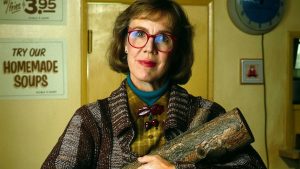
I KNOW CATHERINE, THE LOG LADY still
At the Ashland Independent Film Festival… we [had] four sold out screenings with Q and A’s afterward, because everybody [there loves] Catherine. It’s like she’s a legend and a god. [The Varsity Theater] also held the film over… after the film festival for a two-week run. The amount of affection for her from that audience was just mind boggling. It was almost life changing for a filmmaker. You don’t get people responding to you personally, especially. We were going to go straight to digital release. We weren’t planning theatrical. And David’s passing kind of opened the door. People just kept coming at us. “Please come and screen the film.” And I never would have had the experience if we’d gone straight to digital that I’m having now, which is being able to sit with an audience and feel them get every joke… and the movement and the tears at the end… it’s been a wonderful experience. I am eternally grateful to both Catherine and David for making it possible.
HtN: Oh my gosh, that is so beautiful. I’ve noticed that just in Seattle, there are so many tributes to [Lynch]. Ever since he passed [in] January [2025], there’s still, like, David Lynch festivals and re-releasing his movies at all the independent theaters. The theatrical experience is getting a second wind because of him. And I think he’d love that.
RG: I think he would love it. And from my experience now, because I’ve been to these independent theaters across the country… What I think is happening… is that film theaters are now becoming the water cooler. They’re now becoming the social gathering place cuz where else do we go? You can’t have a conversation at a rock concert. Everything’s too loud. You’re there, you just absorb it. But in a theater, you go, you’re with an audience, you’re responding, you’re listening, you’re laughing, you’re crying, you’re mingling, you’re drinking, you’re waiting in the bathroom line.
And the communal theater… most of these independent theaters have multiple screens. So, you’re really bringing community together. Where else do we do that in our culture? … and most of the theater owners that I’m meeting are really committed to the idea of local independent cinema. And having all come off of COVID… remembering what it’s like to sit in an audience – a full audience… there’s a big difference between 300 people watching something together and five people watching something together… A laugh will start in one end of the room and just carry through and build because you become something more. You become an audience together experiencing something. It’s a very humanizing process.
HtN: Yeah. Oh, that’s beautiful.
RG: I hope that independent theaters thrive.
HtN: Gosh, me too. Yeah, we have some really great ones here, but it’s nice to hear that it’s happening other places too. One of the reasons I moved here was because of the independent theaters. Obviously, a highlight of your film is the interview with David because he didn’t give that many interviews. Would you please speak about that experience?
RG: I had a great teacher, Robert Benedetti, who once said that style was, “the pathway from intention to execution”. It’s what happens when you get the idea. And by the time it gets out, that’s the style. I thought that was a very accurate description. As an actor, the greatest experience I ever had… including the stuff I’ve directed myself in, was working with David Lynch and Mulholland Drive. He knew my work from those many years ago when I met Catherine, and I was doing a show here in LA. I used to do improvised verse with an English accent… It was a street act that I then translated to theaters for a while. And David used to come and watch me do that at this place called The Mayfair Music Hall here in Los Angeles. It’s no longer around, but it was an English style music hall, and I was on the bill, and I had a drinks budget. So, David and Jack, who loved to drink, would come a couple of times a week and watch me do my act so they could sit and drink, you know, on the house. And I think they liked the act.
Years later… David called me and said, [Lynch voice] “I’ve been looking for a role for you for 40 years, Richard.” … And that experience was amazing. He sent me seven pages in English. And at the end of the phone call – this had to happen in a couple of days – he asked me to translate it [from English] to French and Spanish. I said, “Okay, have you got a translator?” And he said, [Lynch voice] “Here’s my home number, Richard. Call me tomorrow.” And of course, he wasn’t there. And I called other people, and I
translated it. And all of a sudden… this seven-page scene was now twenty-one pages because it was in three languages. And I had less than forty-eight hours to memorize it…. and for some reason, I felt – I don’t know where I got this in my head – the permission to go in and arrange it. I thought, “if he doesn’t like it, then we’ll just do each individual take”. But I arranged it – French, Spanish. However it felt [right] to me as a jazz musician… Kind of like Billy Strayhorn working with a brilliant [Duke] Ellington score… I handed it to him, and I said, “here’s the twenty-one pages, English, Spanish, and French. And here is what I kind of put together. It’s like ten pages”. And he said, “Well, let’s see it”. And Naomi and Laura were up in the balcony and the whole thing was right there on that big stage. And I showed it to him. And the moment that he hit the stage, came out of the darkness to me… The look on his face, the light in his eyes and the [does a thumbs up, Lynch voice] “Aces, Richard!” I just knew he understood everything that I had done… And I’ve talked to other actors. The best audience they ever had in their life was David Lynch. He was like this excited kid that just emanated joy when you hit it. It was quite an amazing feeling. It was enough to – not stop me from acting – but allow me to move off [of it]. I’ve never needed another acting role. I’d love to do some more challenging acting roles. It’s fun for me, but I never needed to do it again, cuz once we had done that, I knew that we had done something unique.
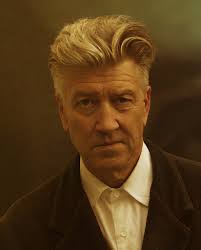
The late, great David Lynch
That feeling of intimately being understood… was exactly what happened when I sat down and interviewed him twenty-something years later about Catherine. He just let the veil fall. It was me and him, and it was Donna Dubain, our executive producer, who passed just weeks before he did. She was on the other side of the camera, and there are these wonderful moments when David looks at you. It looks like he’s looking into eternity and finding emotion and inspiration, and then he’ll turn back to me and finish the sentence. It’s Donna… He’s talking to both of us. It was the same thing I got from Mulholland Dr. It was this incredible connection, this openness. We got each other. And, ya know, we weren’t buddies. I visited his studio. I never went to his home. We knew each other over fifty years. We worked on three projects together: I Don’t know Jack, Mulholland Dr, and I know Catherine, the Log Lady. [I’m ] lucky for the collaboration. It changed my life.
HtN: I really loved when he talks about Catherine’s near-death experience – when she threw up her stomach lining – the way he tells it is like the most Lynchian visual description ever. And then I read that [it was a] three-part story that stemmed from one question. What was the one question?
RG: “Did Catherine meditate?”
I didn’t know that they had started together… I knew that he meditated because when I was at the Cannes film festival for my two movies [7 Year Zig Zag, and I Don’t Know Jack] – which were in the market, not in the festival – and [my] band played the opening thing and then I ran into David. I wasn’t invited to the Mulholland Drive premiere [by the film company]. I ran into David the day after the opening in a parking lot he said, [Lynch voice] “Richard! Are ya comin’ to the premiere of Mulholland Drive?” And I said, “Are you inviting me?” He said, “Yeah!” So, me and Donna Dubain, who was there with me, our producer, got to walk the red carpet with David. Then we hung out for a couple of days. He had a big entourage there… including Eli Roth, the horror Meister. He was there because he had made a short film and David loved it and brought him with everybody to Cannes.
They were all into [Transcendental Meditation]. And I thought, I thought, “this is culty”. Because I’ve heard about T.M. You pay money and they give you a word and you say the word and you get to meditate. I thought that was weird. Once I did the interview with David, once he told that elaborate story about Catherine, but also a couple of other things he said during the interview that aren’t in the film, I thought this would benefit me. A: It’s about stress reduction and I was entering a stressful period of my life. But B: it might help me understand David and Catherine’s relationship and who they were and how they viewed things.
And so, I took the training and it’s been wonderful for me. I’m convinced and avid that it’s a great psychological, physical, spiritual technique that everybody who can, should learn because it has just immediate benefits. The culty part, the religious part [is] very separate from the techniques. And the wonderful thing about the David Lynch Foundation, which David started and funded and is just doing great work is that they train soldiers with P.T.S.D. They train battered and abused women. They train at-risk kids in this technique that reduces stress. And I’ve been very, very grateful for it.
HtN: That’s awesome. Yeah, we could all use a little stress reduction these days.
RG: Yes, we sure could.
HtN: I read that you didn’t watch [Twin Peaks] The Return until after you finished filming the documentary and then you watched it from beginning to end to look for ways to fill in the blanks?
RG: Both David and I… did not want this to be a movie about Twin Peaks. We knew that we were funded largely by Twin Peaks backers and fans on Kickstarter. The Twin Peaks community would love this. And once I had the interview with David it was just so clear that we could just release the interview and we’d have a movie. [Laughs] But both of us felt that what was extraordinary about Catherine’s life was who she was as a person and that was colored by what she had done in her life. And Twin Peaks was a portion of it – a big portion, an important one – but [only] a portion…
So, my decision was [to] do all of the interviews… talk to all of her friends from all of these different areas so that what I’m putting in my hard drive has a balance… gives us the whole sense of life. Then I can go in and see what will work from Twin Peaks to help us explain it. So, I didn’t watch The Return when it came out. I conducted over sixty interviews before I sat down and watched every episode of Twin Peaks from beginning to end. Twice.
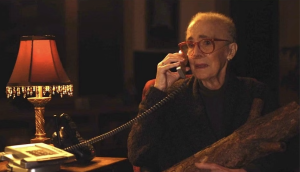
Catherine Coulson in TWIN PEAKS: THE RETURN
The first time, just to sit down and watch them and absorb it. And it was a pretty strange period in my life because that’s all I was doing… I had wonderful relationships, and I had a great son, and I was doing stuff in life. But then I’d come into the studio [and] spend eight to ten hours a day just entering this world… So, it was like binge watching with a purpose… all three seasons, all the Log Lady intros, Fire Walk with Me, interviews, anything that had been done. Once I had done that, [and] watched over a hundred hours of our own interviews… Because the film is structured as an ongoing conversation amongst all of Catherine’s friends… Then there was a period that took a long time where I structured it into beats, the different aspects of her life and different thematic elements. Then I watched all of the interviews again. If one of the interviews talked about dancing, then it went into the dancing sequence. And if somebody else talked about Twin Peaks… I put it into its place… So, it was a very reductive process… We had to make a three-part miniseries before we could make the feature. We couldn’t go the other way… And then from there, it’s like taking wine and making cognac… You have to reduce it, distill it down, and it has all of the essence of everything that’s in the larger piece.
We’re hoping that if this film is successful, if people see it, that maybe there will be a market for the deeper, larger story, which I hope is the case, because I think it’s wonderful and [we’ll get] that much more David and that much more Catherine.
HtN: Yeah. I would definitely watch that.
I was really moved by the interview you conducted with Bill Haugse, Catherine’s ex-husband. He mentions that he was reticent to do the interview because he was worried it would paint him in a bad light.
RG: Bill was obviously very, very close to Catherine. And the first person I talked to about this film was Donna Dubain, our executive producer and one of my closest friends. And she took me to Jenny Sullivan, who became our producer, and convinced her that this was worth doing with me… And then we went to Bill Haugse, and Bill really wanted to direct it. He’s a wonderful, talented filmmaker. He was nominated for an Oscar for Hoop Dreams as an editor. But I felt that his personal perspective would limit the picture that I wanted to paint of Catherine. I supported him in making an attempt and he shot a couple of interviews [for the film], and then felt that he didn’t have a handle on it… That’s to his credit, to be able to say, “Yeah, this isn’t for me”. And it wasn’t until after my interview with David [that] Bill got on board with the project. But he was still very reluctant to do an interview… And my honest opinion is the reason that it was such a successful interview with Bill is that, again, it was me interviewing him, then the camera to my right. And on the other side of that was Jenny. And Jenny was one of Catherine’s closest friends. And was probably one of the people who condemned Bill’s behavior when he treated her badly all those years ago. And though Catherine forgave him and brought him back into the fold at the very end of his life, and everybody, all of her friends who were there, were open to Bill and didn’t alienate him, [but] I don’t think that they ever gave him the forgiveness that he sought.
So, I think that this interview that he gave me with Jenny right there was kind of a Mea Culpa. It was kind of his opportunity to cleanse himself of his own guilt for how he’d behaved previously. And the beauty of the interview and the gratitude that I have to Bill as a human being is that he ripped it open. He just gave it all to us. And I think that even in the course of… the interview, he found some absolution. And he was at our big Hollywood screening at the Egyptian. And I think he felt quite good about what he’d done and what we had done. And I’m grateful to him for all of his help on this film.
HtN: I’m so glad to hear that because I did find his interview so honest and raw. And it’s just so rare to see someone have so much hindsight and understanding…
RG: and COURAGE.
HtN: …and honesty. It was so moving. So, I’m really glad that he felt like he could do that and that you were able to convince him to do that.
You managed to assemble quite an impressive cast of interviews. Was there anyone that you wanted to interview but you couldn’t get them?
RG: Mädchen Amick [Shelly Johnson from Twin Peaks] and I made a strong attempt to get together… And she’s a really, really lovely woman who we spoke to afterward. So, it would have been nice to have Mädchen’s interview… I was sort of following who was available and when. Subsequently, I had a wonderful conversation with Ray Wise [Leland Palmer from Twin Peaks]… I think he has some wonderful stories to tell. There are a bunch of people who I wish that I had had the opportunity to interview… There are people that you don’t see in the film that we did interview that are wonderful as well… My father had a saying that I’ve lived by as an artist, which is, “The mind can only absorb what the ass can take.” So, if people are fidgeting, if it’s too long, or if you haven’t got the cut quite right, you really have to be aware of our ways our minds absorb information.
HtN: You started with the three-part series and whittled it down to feature-length. What was the hardest thing to cut – the thing that you were saddest to cut?
RG: Wow, that’s a tough one. You know, I can’t answer that question, but I’ll give you an answer. This morning, I was told we got an e-mail or a response on Facebook from a gentleman by the name of Joe Romano. Joe Romano’s wife, Lisa Loomer, is in the movie. She’s a dark-haired woman who talks about life and what the dead tell us, and Catherine, she’s there at the end saying how funny that was, a high sense of humor. And Joe is a brilliant composer and horn player. And he was very essential in helping Catherine get through the chemo. He was her chemo partner in Ashland and a very close friend of hers, and he moved me very much. It’s all in the three-part miniseries, but we just couldn’t go that deep into that physical part of her illness in [the feature]. It was a distraction from the through-line and the thrust of the story. He sent us a nice note today… I’m sorry that Joe isn’t in… this version of it, [and] that the audience doesn’t get to see the humanity of that man and his perspective of Catherine… But hopefully we’ll get that three-part out there at some point and everybody will get to see Mr. Joe Romano be a great friend to Catherine.
HtN: I would watch any length cut of this film just so you know. Can’t get enough. Well, thank you so much, Richard. This has been an absolute delight talking to you.
RG: I really appreciate your questions and your perspective of the film.
I Know Catherine, the Log Lady is playing in independent theaters across the country. Check your local listings and iknowcatherine.com to find out more. To hear the full interview, please visit Really Weird Stuff Podcast on YouTube and the usual purveyors of fine podcasts.
– Jessica Baxter (@tehBaxter)








